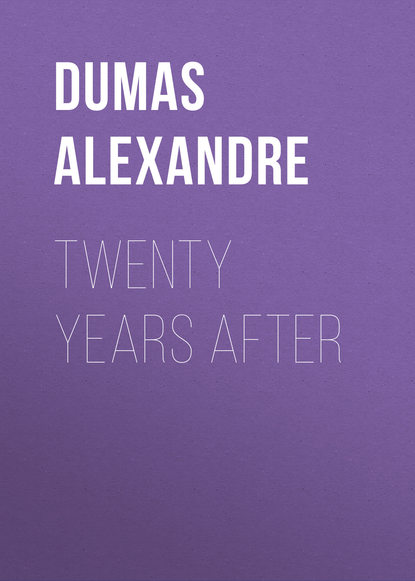По всем вопросам обращайтесь на: info@litportal.ru
(©) 2003-2024.
✖
Twenty Years After
Настройки чтения
Размер шрифта
Высота строк
Поля
“For my part,” said Porthos, “I desire to be made a baron.”
“You shall be one.”
“And have you not seen any of our other friends?”
“Yes, I have seen Aramis.”
“And what does he wish? To be a bishop?”
“Aramis,” answered D’Artagnan, who did not wish to undeceive Porthos, “Aramis, fancy, has become a monk and a Jesuit, and lives like a bear. My offers did not arouse him, – did not even tempt him.”
“So much the worse! He was a clever man. And Athos?”
“I have not yet seen him. Do you know where I shall find him?”
“Near Blois. He is called Bragelonne. Only imagine, my dear friend. Athos, who was of as high birth as the emperor and who inherits one estate which gives him the title of comte, what is he to do with all those dignities-the Comte de la Fere, Comte de Bragelonne?”
“And he has no children with all these titles?”
“Ah!” said Porthos, “I have heard that he had adopted a young man who resembles him greatly.”
“What, Athos? Our Athos, who was as virtuous as Scipio? Have you seen him?
“No.”
“Well, I shall see him to-morrow and tell him about you; but I’m afraid, entre nous, that his liking for wine has aged and degraded him.”
“Yes, he used to drink a great deal,” replied Porthos.
“And then he was older than any of us,” added D’Artagnan.
“Some years only. His gravity made him look older than he was.”
“Well then, if we can get Athos, all will be well. If we cannot, we will do without him. We two are worth a dozen.”
“Yes,” said Porthos, smiling at the remembrance of his former exploits; “but we four, altogether, would be equal to thirty-six, more especially as you say the work will not be child’s play. Will it last long?”
“By’r Lady! two or three years perhaps.”
“So much the better,” cried Porthos. “You have no idea, my friend, how my bones ache since I came here. Sometimes on a Sunday, I take a ride in the fields and on the property of my neighbours, in order to pick up a nice little quarrel, which I am really in want of, but nothing happens. Either they respect or they fear me, which is more likely, but they let me trample down the clover with my dogs, insult and obstruct every one, and I come back still more weary and low-spirited, that’s all. At any rate, tell me: there’s more chance of fighting in Paris, is there not?”
“In that respect, my dear friend, it’s delightful. No more edicts, no more of the cardinal’s guards, no more De Jussacs, nor other bloodhounds. I’Gad! underneath a lamp in an inn, anywhere, they ask ‘Are you one of the Fronde?’ They unsheathe, and that’s all that is said. The Duke de Guise killed Monsieur de Coligny in the Place Royale and nothing was said of it.”
“Ah, things go on gaily, then,” said Porthos.
“Besides which, in a short time,” resumed D’Artagnan, “We shall have set battles, cannonades, conflagrations and there will be great variety.”
“Well, then, I decide.”
“I have your word, then?”
“Yes, ‘tis given. I shall fight heart and soul for Mazarin; but-”
“But?”
“But he must make me a baron.”
“Zounds!” said D’Artagnan, “that’s settled already; I will be responsible for the barony.”
On this promise being given, Porthos, who had never doubted his friend’s assurance, turned back with him toward the castle.
12. Porthos was Discontented with his Condition
As they returned toward the castle, D’Artagnan thought of the miseries of poor human nature, always dissatisfied with what it has, ever desirous of what it has not.
In the position of Porthos, D’Artagnan would have been perfectly happy; and to make Porthos contented there was wanting-what? five letters to put before his three names, a tiny coronet to paint upon the panels of his carriage!
“I shall pass all my life,” thought D’Artagnan, “in seeking for a man who is really contented with his lot.”
Whilst making this reflection, chance seemed, as it were, to give him the lie direct. When Porthos had left him to give some orders he saw Mousqueton approaching. The face of the steward, despite one slight shade of care, light as a summer cloud, seemed a physiognomy of absolute felicity.
“Here is what I am looking for,” thought D’Artagnan; “but alas! the poor fellow does not know the purpose for which I am here.”
He then made a sign for Mousqueton to come to him.
“Sir,” said the servant, “I have a favour to ask you.”
“Speak out, my friend.”
“I am afraid to do so. Perhaps you will think, sir, that prosperity has spoiled me?”
“Art thou happy, friend?” asked D’Artagnan.
“As happy as possible; and yet, sir, you may make me even happier than I am.”
“Well, speak, if it depends on me.”
“Oh, sir! it depends on you only.”
“I listen-I am waiting to hear.”
“Sir, the favor I have to ask of you is, not to call me ‘Mousqueton’ but ‘Mouston.’ Since I have had the honor of being my lord’s steward I have taken the last name as more dignified and calculated to make my inferiors respect me. You, sir, know how necessary subordination is in any large establishment of servants.”
D’Artagnan smiled; Porthos wanted to lengthen out his names, Mousqueton to cut his short.
“Well, my dear Mouston,” he said, “rest satisfied. I will call thee Mouston; and if it makes thee happy I will not ‘tutoyer’ you any longer.”
“Oh!” cried Mousqueton, reddening with joy; “if you do me, sir, such honor, I shall be grateful all my life; it is too much to ask.”

















